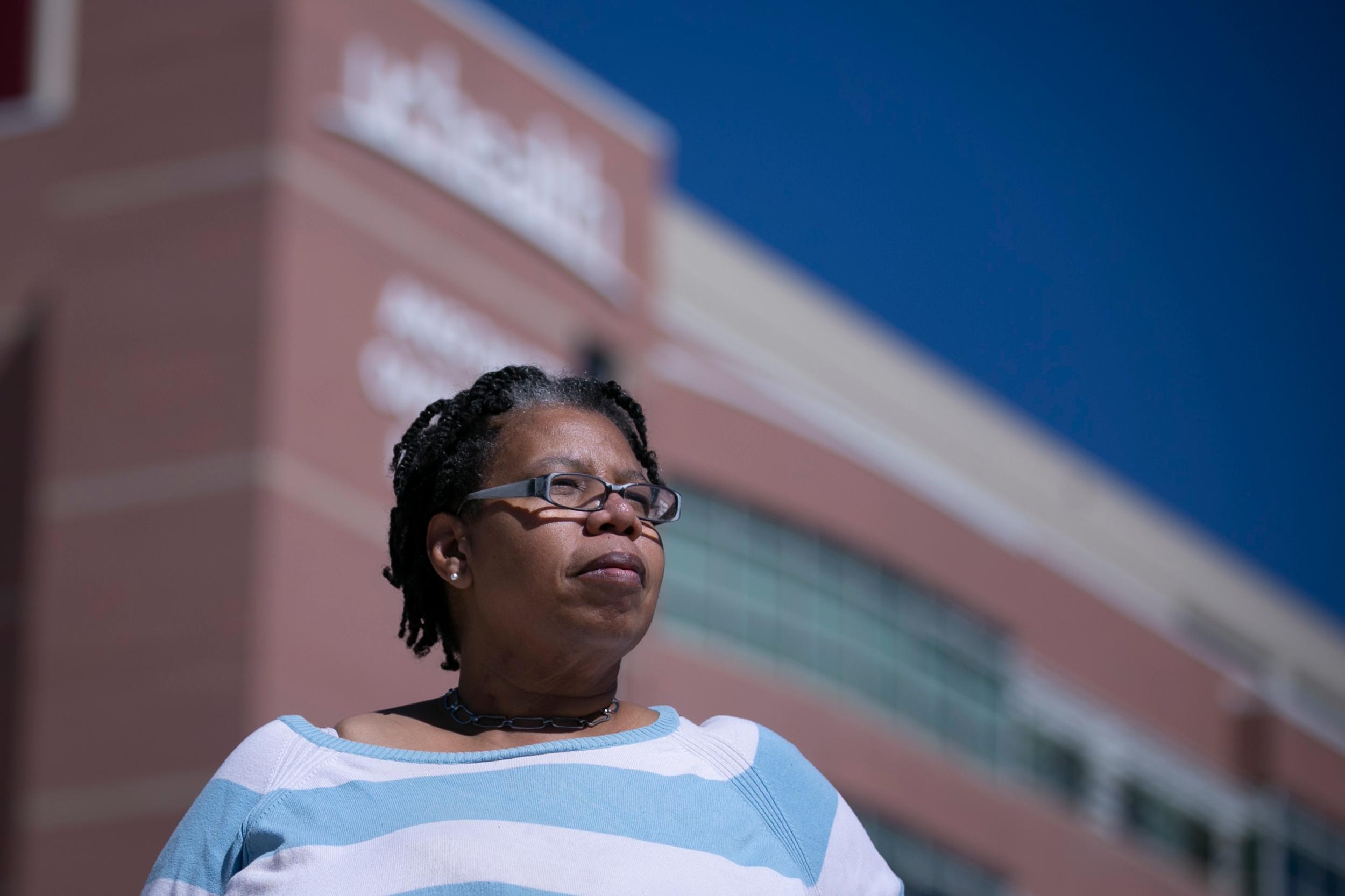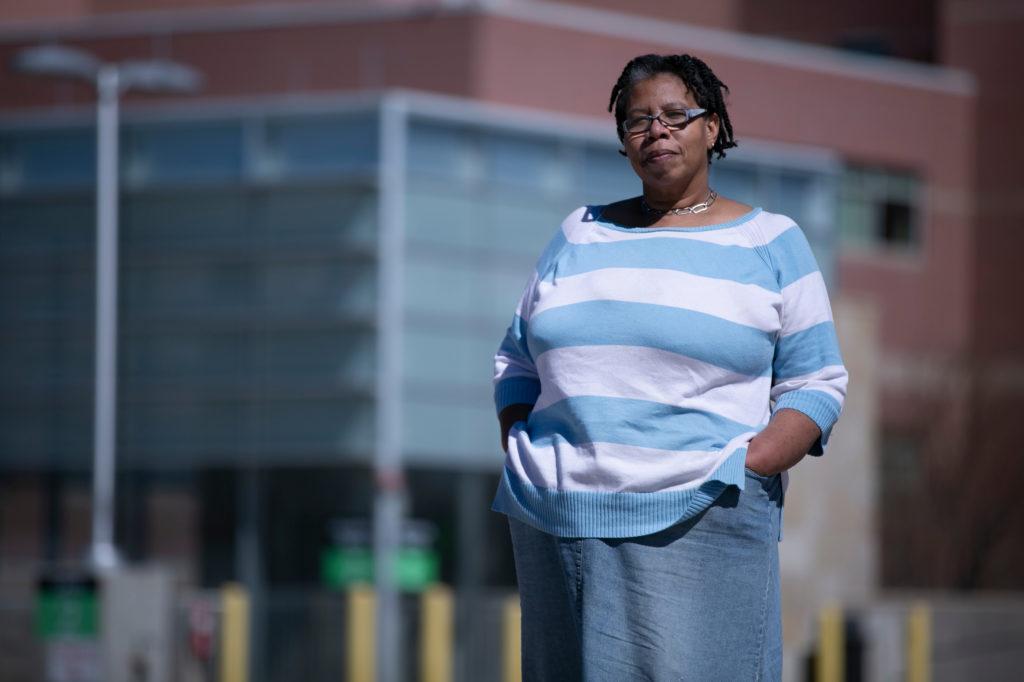
Ravi Turman was so new to Colorado that she mistook symptoms of COVID-19 for altitude sickness.
“The shortness of breath I kind of just brushed off as me being new to Colorado,” Turman said. “It did not feel any different from a cold, from a bad cold.”
Only after her lips turned blue did the Indianapolis native finally go to the hospital. Her condition was so grave that doctors in the emergency department at UCHealth University of Colorado Hospital quickly put Turman on a ventilator and induced a coma.
“I wondered at one point, am I dead? Is this what dead is like?” Turman remembered. “I was hearing different voices saying different things. Some of it sounded like they were about to prepare for my funeral.”
Turman, 51, spent 10 days on the ventilator, unconscious in one of the hospital’s five COVID-19 intensive care units.
“One day I felt like I was actually leaving, meaning I was about to die, and what I felt snapped me back was my mother,” Turman recalled. “It was almost as if she was praying and she was saying, ‘I can't lose another child.’”
Turman said she also heard the voice of her daughter pleading with her to live. She said the voices of her loved ones penetrated her coma and convinced her to survive.
Turman is one of the first patients in Colorado to be placed on a ventilator and successfully survive COVID-19, according to an unscientific analysis by UCHealth and the Colorado Hospital Association.
Turman is African American, and data shows that black people in Colorado and across the country are disproportionately more likely to contract COVID-19 or die from the disease.
In Colorado, African Americans make up 4.6 percent of the population, but the most recent data from the Colorado Department of Public Health and Environment indicates that black people account for 7.7 percent of COVID-19 cases and about 6.6 percent of deaths.
In cities that have large African American populations, like Chicago, the data paints an even grimmer picture. There, black people make up about 30 percent of the population, but comprise 40 percent of COVID-19 cases and more than 54 percent of deaths, according to official data released April 29.
Doctors say people who have certain pre-existing conditions, like obesity, diabetes and high blood pressure, are more susceptible to contracting COVID-19, the disease caused by novel coronavirus.
These conditions exist in higher rates in African Americans compared to white people. Turman is borderline diabetic and has high blood pressure. She also has a compromised immune system, which doctors say can make a person more susceptible to COVID-19. Ten years ago, she had surgery to remove cancer in her lymph nodes.

Health advocates say COVID-19’s disproportionate impact on the African American community can’t be explained by pre-existing conditions alone. They point to socio-economic factors in play.
“We've always had persistent health disparities really due to systemic issues that go far beyond health with regard to access to housing, access to food,” Deidre Johnson, executive director of the Center for African American Health, said in an interview on Colorado Matters. “If we don't get to the root causes of these disparities, the next COVID-19 attack is going to wreak the same amount of havoc.”
Even the types of jobs African Americans are more likely to work can put them at risk of exposure. Minority groups more often work jobs that require working on site – construction, service jobs, restaurant kitchens – where working from home or social distancing at work is not possible.
State Rep. Leslie Herod, a Democrat from Denver, pointed out that African Americans make up 35 percent of RTD bus drivers and 22 percent of rail operators. Public transportation has been deemed an essential service.
“They are out there every single day ensuring that the buses are continuing to run,” Herod told Colorado Matters. “We've seen some of the lack of personal protective equipment that they have.”
Both Herod and Johnson say the medical community needs to provide more equitable access to health care to communities of color.
“We also have to acknowledge that a lot of folks in the African American community don't even have access to a primary care physician, so requiring that there's a doctor's order first is just not working,” Herod said, referring to early requirements for COVID-19 testing and treatment.
Advocates are pressing for better and faster data collection when health emergencies like the coronavirus pandemic strike minority communities.
Rep. Herod is calling for robust data collection and analysis -- “down to the neighborhood and ZIP code” -- so health professionals can identify areas of urgent need.
State agencies and some local health departments are starting to mobilize in minority neighborhoods. The Denver Department of Public Health and Environment has implemented a mobile coronavirus testing program in far northeast Denver, home to a large number of African Americans.
Advocates are pushing for additional resources to combat COVID-19. Herod wants Colorado to implement Race Rapid Response Teams, modeled after a program started in Chicago. These teams would deploy quickly to minority neighborhoods as outbreaks occur.
Gov. Jared Polis on Wednesday announced the members of a newly formed state COVID-19 Health Equity Response Team.
Members include Deidre Johnson, Colorado Democrat Rep. Joe Neguse and medical professionals and public health advocates from minority communities throughout Colorado.
According to the governor, the team will help:
- Ensure racial and ethnicity COVID-19 data are accessible, transparent and used in decision-making;
- Determine proactive measures to prevent the spread of COVID-19 in specific communities;
- Work with state teams coordinating resources and logistics to help curb health disparities related to COVID-19;
- Increase access to testing and care services;
- Share time-sensitive information about how Colorado communities are experiencing particular challenges related to the COVID-19 response;
- Develop policy recommendations to better assist and prepare communities of color during the current COVID-19 pandemic as well as future state emergencies.
Herod said the team’s first meeting will be Thursday. She welcomes its creation.
“What I don't want to see happen is us waiting until the end of this pandemic, whenever that may be to say, 'Darn, we lost a lot of black and brown people,' ” Herod said. “Instead we could say, we know the inequalities exist. We are seeing it in the data and now we are going to respond quickly. So we can bring down these disparities and make sure that more Coloradans make it on the other side of this pandemic alive.”
For Ravi Turman, she is grateful to be alive, aware the odds were not in her favor.
“After I woke up, I was like, I'm African American, I'm still here,” she said from her home in Aurora where she is recovering. “I've talked to several friends who have either had it or been affected by it, family members passing away.”
Philip Maravilla is a freelance writer and producer based in Denver.








